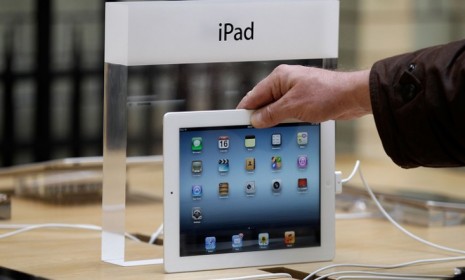Apple's rumored iPad Mini: 5 features it needs to succeed
With a rumored October launch, the house that Jobs built seems set to enter the fiercely competitive world of compact budget tablets

A free daily email with the biggest news stories of the day – and the best features from TheWeek.com
You are now subscribed
Your newsletter sign-up was successful
The iPhone 5 pre-sold a record 2 million units in its first 24 hours last week — despite being labeled a disappointment. And now that Apple's latest mega-hyped smartphone has been unveiled, the technorati can focus on Apple's next big launch: A long-rumored, budget-edition tablet that the tech press has nicknamed the iPad Mini. Many customers simply can't afford Apple's pricey iPad (starting price: $500), and a smaller, portable, less-expensive tablet, which will reportedly launch in early October, would allow Apple to go toe-to-toe with cheaper rivals like Google's Nexus 7 and Amazon's newly revealed 7-inch Kindle Fire HD. What would it take for an iPad Mini to be a hit? Here, five key factors:
1. Siri
Apple's virtual helper has become a "key ingredient" in the company's mobile devices, says Don Relsinger at eWeek. If Apple fails to bundle Siri with its smaller slate, it would certainly "annoy many customers," who have come to expect Siri on all their devices — despite her debatable usefulness.
The Week
Escape your echo chamber. Get the facts behind the news, plus analysis from multiple perspectives.

Sign up for The Week's Free Newsletters
From our morning news briefing to a weekly Good News Newsletter, get the best of The Week delivered directly to your inbox.
From our morning news briefing to a weekly Good News Newsletter, get the best of The Week delivered directly to your inbox.
2. Expandable storage
Among the ways Apple's compact tablet could improve upon the Nexus? Expandable storage, says Karsten Strauss at Forbes. Right now, Google doesn't have it. If Apple wants an edge, it'll need to offer something decidedly different — and imagine how cool it would be if the iPad Mini came with a drive into which you could slide a memory-expanding flash card?
3. Cameras
"The iPod Touch has a camera. The iPhone has a camera. [And] alleged iPad Mini cases have shown a camera, too," says Scott Stein at CNET. We'd expect Apple to include a front-facing camera for FaceTime, and a rear-camera should come standard. After all: "The ever-more-affordable iPhone 4 includes the same." Although Amazon left cameras off the first edition of the Kindle Fire to keep costs down, a camera-less iPad Mini would be a monumental disappointment.
A free daily email with the biggest news stories of the day – and the best features from TheWeek.com
4. A longer-lasting battery
"Battery drain is typically an issue with Apple products," says Dave Smith at the International Business Times. "Amazingly," most iProducts hold only seven to 10 hours of juice between charges. At the very least, Apple will try to squeeze in a battery big enough to accomplish 10 hours of WiFi surfing. But "it would be an added bonus" if the new, cheaper iPad Mini offered 11 or 12 hours.
5. A reasonable price tag
Amazon and Google's 7-inch base-model tablets cost $199, so, if Apple hopes to sell millions of units of the iPad Mini, it probably shouldn't cost more than $250, says Pop Herald. But "can [the device] still lure customers" if the price inches toward $300 or $400? Probably, says Ewan Spence at Forbes. A $299 entry-level iPad Mini would "slot into a gap in the existing range of Apple devices." After all, Amazon may be content to sell its tablets at a loss, but "Apple's business model works right now," and the company probably doesn't want to "change [its] basic strategy of making a profit on hardware."
-
 Political cartoons for February 16
Political cartoons for February 16Cartoons Monday’s political cartoons include President's Day, a valentine from the Epstein files, and more
-
 Regent Hong Kong: a tranquil haven with a prime waterfront spot
Regent Hong Kong: a tranquil haven with a prime waterfront spotThe Week Recommends The trendy hotel recently underwent an extensive two-year revamp
-
 The problem with diagnosing profound autism
The problem with diagnosing profound autismThe Explainer Experts are reconsidering the idea of autism as a spectrum, which could impact diagnoses and policy making for the condition